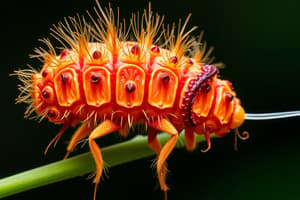Podcast
Questions and Answers
What are the five core concepts of biology?
What are the five core concepts of biology?
This is a broad question, the five core concepts could vary. However, here are five common ones:
- Cell Theory: All living organisms are made up of cells, and all cells come from pre-existing cells.
- Gene Theory: Traits are passed down from parents to offspring through genes, which are part of DNA.
- Evolution Theory: The diversity of life on Earth is a result of modifications over long periods of time.
- Homeostasis: Living organisms maintain stable internal conditions despite changing environments
- Ecosystems: Living organisms interact with each other and their environment in complex ways.
Describe the process of science from initial observations to publishable results.
Describe the process of science from initial observations to publishable results.
The process of science is a systematic approach to understanding the world. The basic stages are:
- Observation: Notice something interesting in the world.
- Question: Formulate a question about the observation.
- Hypothesis: Propose a testable explanation for the observation.
- Prediction: Make a prediction about what will happen if the hypothesis is true.
- Experiment: Design and conduct an experiment to test the prediction.
- Analysis: Analyze the results of the experiment and draw conclusions.
- Communication: Share the findings with the scientific community through publications, presentations, etc.
What are the two main types of scientific studies?
What are the two main types of scientific studies?
- Descriptive studies and experimental studies
- Controlled experiments and observational studies (correct)
- Quantitative studies and qualitative studies
- Experimental studies and theoretical studies
How does sample size affect the strength of conclusions in a scientific study?
How does sample size affect the strength of conclusions in a scientific study?
What is the main difference between the everyday and scientific meanings of the word "theory"?
What is the main difference between the everyday and scientific meanings of the word "theory"?
What are the two main types of observational studies?
What are the two main types of observational studies?
A correlation in a scientific study always proves a cause-and-effect relationship.
A correlation in a scientific study always proves a cause-and-effect relationship.
Why might a single study not be enough to make definitive conclusions about an issue?
Why might a single study not be enough to make definitive conclusions about an issue?
How can a skeptical consumer critically evaluate a news report about a scientific study?
How can a skeptical consumer critically evaluate a news report about a scientific study?
Which of these are examples of resources for finding peer-reviewed articles?
Which of these are examples of resources for finding peer-reviewed articles?
What are two common sources of scientific misinformation or bias?
What are two common sources of scientific misinformation or bias?
Flashcards
Core Concepts of Biology
Core Concepts of Biology
Five fundamental ideas underpinning the study of life.
Scientific Process
Scientific Process
Systematic way scientists gather knowledge from observation to published results.
Anecdotal vs. Scientific
Anecdotal vs. Scientific
Comparing evidence-based studies to personal stories.
Control Group
Control Group
Signup and view all the flashcards
Experimental Group
Experimental Group
Signup and view all the flashcards
Controlled Experiment
Controlled Experiment
Signup and view all the flashcards
Sample Size
Sample Size
Signup and view all the flashcards
Scientific Theory
Scientific Theory
Signup and view all the flashcards
Everyday Theory
Everyday Theory
Signup and view all the flashcards
Case-Control Studies
Case-Control Studies
Signup and view all the flashcards
Randomized Clinical Trials
Randomized Clinical Trials
Signup and view all the flashcards
Correlation vs. Causation
Correlation vs. Causation
Signup and view all the flashcards
Media Misinterpretations
Media Misinterpretations
Signup and view all the flashcards
Skeptical Consumer Questions
Skeptical Consumer Questions
Signup and view all the flashcards
Peer-Reviewed Articles
Peer-Reviewed Articles
Signup and view all the flashcards
Web of Science
Web of Science
Signup and view all the flashcards
Google Scholar
Google Scholar
Signup and view all the flashcards
PubMed
PubMed
Signup and view all the flashcards
Scientific Validity
Scientific Validity
Signup and view all the flashcards
Initial Observations
Initial Observations
Signup and view all the flashcards
Study Notes
Core Concepts of Biology
- Define the five core concepts of biology and relate them to classroom material.
Scientific Process
- Describe the process of science, from observation to publishable results.
Comparing Scientific and Anecdotal Conclusions
- Compare and contrast rigorous scientific study conclusions with conclusions drawn anecdotally.
Controlled Experiments
- Compare and contrast control and experimental groups in a controlled experiment.
- Describe the design of a controlled experiment.
- Illustrate how sample size impacts the strength of conclusions drawn from studies.
Scientific vs. Everyday Meanings
- Compare and contrast scientific and everyday meanings of the word "theory."
Case-Control and Clinical Trials
- Describe the pros and cons of case-control studies and randomized clinical trials.
Correlation vs. Causation
- Explain why correlation in a scientific study does not necessarily indicate causation.
Media Headlines and Scientific Results
- Explain why media headlines may not accurately reflect scientific study results.
- List questions a critical reader should ask about a media report.
Resource Utilization
- Demonstrate use of resources like Web of Science, Google Scholar, or PubMed to find peer-reviewed articles.
Studying That Suits You
Use AI to generate personalized quizzes and flashcards to suit your learning preferences.




